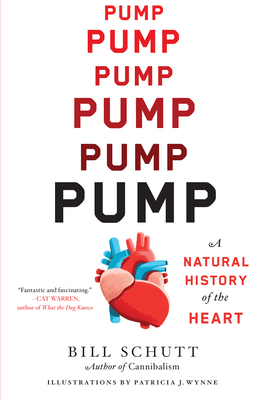Pump: A Natural History of the Heart

Pump: A Natural History of the Heart
"Fascinating . . . Surprising entertainment, combining deep learning with dad jokes . . . [Schutt] is a natural teacher with an easy way with metaphor."--The Wall Street JournalZoologist Bill Schutt delivers a look at the science behind hearts from across the animal kingdom-- from insects to whales to humans-- in this lively natural history.
Millennia ago, when we first began puzzling over the mysteries of the human body, one organ stood out as vital. The heart was warm, it was central, and it moved as it pumped blood. The ancient Egyptians treated it with reverence, mummifying it separately from the body so that the soul inside it could be weighed. Aristotle believed that it was the seat of consciousness. Over the centuries, science has dispelled the myths, but our fascination with the heart has endured. From the origins of circulation, still evident in some microorganisms today, to the enormous hearts of blue whales, we journey with Bill to beaches where horseshoe crabs are being harvested for their life-saving blood, and under the sea to learn about the world's most natural antifreeze, flowing through the veins of icefish. And we follow him through human history, too, as scientists hypothesize wrongly and rightly about what is arguably our most important organ, ultimately developing the technologies that have helped us study the heart--and now, in the most cutting-edge labs, the tools that will help us regenerate it. Deeply researched and engagingly told, Pump is a fascinating natural history sure to be loved by readers of Mary Roach and Bill Bryson.
"Fascinating . . . Surprising entertainment, combining deep learning with dad jokes . . . [Schutt] is a natural teacher with an easy way with metaphor."--The Wall Street JournalIn this lively, unexpected look at the hearts of animals--from fish to bats to humans--American Museum of Natural History zoologist Bill Schutt tells an incredible story of evolution and scientific progress. We join Schutt on a tour from the origins of circulation, still evident in microorganisms today, to the tiny hardworking pumps of worms, to the golf-cart-size hearts of blue whales. We visit beaches where horseshoe crabs are being harvested for their blood, which has properties that can protect humans from deadly illnesses. We learn that when temperatures plummet, some frog hearts can freeze solid for weeks, resuming their beat only after a spring thaw. And we journey with Schutt through human history, too, as
PRP: 167.09 Lei
Acesta este Prețul Recomandat de Producător. Prețul de vânzare al produsului este afișat mai jos.
150.38Lei
150.38Lei
167.09 LeiIndisponibil
Descrierea produsului
"Fascinating . . . Surprising entertainment, combining deep learning with dad jokes . . . [Schutt] is a natural teacher with an easy way with metaphor."--The Wall Street JournalZoologist Bill Schutt delivers a look at the science behind hearts from across the animal kingdom-- from insects to whales to humans-- in this lively natural history.
Millennia ago, when we first began puzzling over the mysteries of the human body, one organ stood out as vital. The heart was warm, it was central, and it moved as it pumped blood. The ancient Egyptians treated it with reverence, mummifying it separately from the body so that the soul inside it could be weighed. Aristotle believed that it was the seat of consciousness. Over the centuries, science has dispelled the myths, but our fascination with the heart has endured. From the origins of circulation, still evident in some microorganisms today, to the enormous hearts of blue whales, we journey with Bill to beaches where horseshoe crabs are being harvested for their life-saving blood, and under the sea to learn about the world's most natural antifreeze, flowing through the veins of icefish. And we follow him through human history, too, as scientists hypothesize wrongly and rightly about what is arguably our most important organ, ultimately developing the technologies that have helped us study the heart--and now, in the most cutting-edge labs, the tools that will help us regenerate it. Deeply researched and engagingly told, Pump is a fascinating natural history sure to be loved by readers of Mary Roach and Bill Bryson.
"Fascinating . . . Surprising entertainment, combining deep learning with dad jokes . . . [Schutt] is a natural teacher with an easy way with metaphor."--The Wall Street JournalIn this lively, unexpected look at the hearts of animals--from fish to bats to humans--American Museum of Natural History zoologist Bill Schutt tells an incredible story of evolution and scientific progress. We join Schutt on a tour from the origins of circulation, still evident in microorganisms today, to the tiny hardworking pumps of worms, to the golf-cart-size hearts of blue whales. We visit beaches where horseshoe crabs are being harvested for their blood, which has properties that can protect humans from deadly illnesses. We learn that when temperatures plummet, some frog hearts can freeze solid for weeks, resuming their beat only after a spring thaw. And we journey with Schutt through human history, too, as
Detaliile produsului










